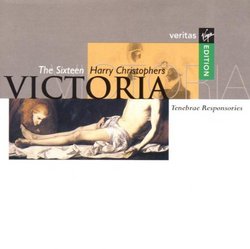| All Artists: Tomas Luis de Victoria, The Sixteen Title: Victoria: Tenebrae Responsories Members Wishing: 0 Total Copies: 0 Label: EMI Import Release Date: 7/14/2005 Album Type: Import Genre: Classical Styles: Opera & Classical Vocal, Historical Periods, Early Music Number of Discs: 1 SwapaCD Credits: 1 UPC: 724356122123 |
Search - Tomas Luis de Victoria, The Sixteen :: Victoria: Tenebrae Responsories
 | Tomas Luis de Victoria, The Sixteen Victoria: Tenebrae Responsories Genre: Classical
|
Larger Image |
CD Details |
CD ReviewsThe recording to buy Guy Cutting | 06/10/2000 (5 out of 5 stars) "I like to start these reviews with a few words about the music on the recording and then move on to the particulars of the recording itself. The pieces here are written for Holy Week services of Maundy Thursday, Good Friday, and Holy Saturday. The texts describe the events leading up to and following Christ's crucifixion. Victoria's settings are profoundly moving - but in truth it is hard to adequately describe these pieces and the effects they have. If you read my other reviews, you'll notice that "contemplation" and "devotion" are words I use quite often. I think they are essential to the interpretation and performance of the sacred works of the Renaissance genre. The intense personal spirituality of the composer is expressed in these compositions (and others of this calibre), and must be allowed to reflect itself in the performance. Several recordings of the Tenebrae pieces compete for attention: the Westminster Cathedral choir, The Sixteen, the Tallis Scholars, and others have recorded them. I am only directly familiar with this recording and that done by the Tallis Scholars (refer to my comments on that recording). I prefer this one for a number of reasons - one is the acoustical quality. The microphones are evidently distant from the singers here and the effect is good - quiet passages seem mystical and more full voiced ones do not sound strained (as in the Tallis Scholars recording). On interpretive level, the singing here preserves much better the spirit of these pieces - the Tallis Scholars sing with what is best described as a "glossy eyed chill" (I borrowed that term from another review on Amazon.com). This recording captures that sense of mystery and contemplation that the Tallis Scholars miss. I have not heard the Westminster recording but I can offer this advice - tuning and balance is often a problem with that group, but the acoustics of the cathedral are exquisite and their artistic approach is usually good - they are likely to do a similar job representing the proper sense of the music as The Sixteen do here. This recording is highly recommeded." Lugubrious and pensive W. Pearce | Pretoria, South Africa | 12/02/2000 (5 out of 5 stars) "From the fabric of an institution that brought us the Spanish
Inquisition and bestowed upon many generations a distorted view of sexuality, comes a magnificent masterpiece with profound emotional insight. Even if at times it amounts to nothing other than the Church's mellifluous baying for the blood of Judas.This setting of the Tenebrae Responsories has been recorded by several choirs over the last few decades. One needs to compare this recording by The Sixteen (1991) with others to gain some insight into the power of this Renaissance masterpiece. No choir has been able to capture the dark, brooding, vigorous, passionate mysticism of the Spanish Counterreformation as did the Westminster Cathedral Choir under George Malcolm (1960). This particular recording will always remain an essential part of my discography. The choir recorded this work again in 1989 with more sedate, but equally satisfying, tempi. However, both recordings suffer from the unauthorized eighteenth century habit of scoring two of the responsories for men's voices only. The recording of the Choir of Trinity College, Cambridge (Richard Marlow, 1990) includes only the first three responsories of each of the Triduum. It infuses a hitherto unheard diaphonous texture into many of the passages, and underscores the incredible word-painting produced by Victoria, such as during " ... ipse est, tenete eum ..." (Responsium IV, second nocturn). The recording by the Tallis Scholars (also 1990) is unexpectedly disappointing - despite the perfectly judged emotions and sonorous voices, the acoustics are more suited to a radio talk show than the setting for a Holy Week liturgy.The Sixteen produced a wonderful recording of the responsories. The sound and microphone setup could not be better. In many aspects it reminds me of the Pro Cantione Antiqua recording (Bruno Turner, 1979), but without the sparseness produced by recording with only one singer per voice. The responsories do not respond to this type of minimalist treatment. With The Sixteen, the searing metallic edge to the soprano voices combined with a rich bass produce a very satisfying effect: along with almost perfect diction, these impart a lugubrious and deeply pensive air to the responsories. Listen to this recording by candlelight. " |

 Track Listings (18) - Disc #1
Track Listings (18) - Disc #1